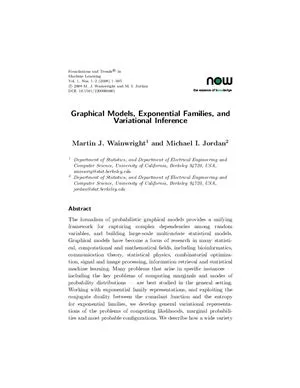Graphical Models, Exponential Families, and Variational Inference
4.4
Reviews from our users

You Can Ask your questions from this book's AI after Login
Each download or ask from book AI costs 2 points. To earn more free points, please visit the Points Guide Page and complete some valuable actions.
Из серии Foundations and Trends in Machine Learning издательства NOWPress, 2008, -305 pp.The formalism of probabilistic graphical models provides a unifying framework for capturing complex dependencies among random variables, and building large-scale multivariate statistical models. Graphical models have become a focus of research in many statistical, computational and mathematical fields, including bioinformatics, communication theory, statistical physics, combinatorial optimization, signal and image processing, information retrieval and statistical machine learning. Many problems that arise in specific instances — including the key problems of computing marginals and modes of probability distributions — are best studied in the general setting. Working with exponential family representations, and exploiting the conjugate duality between the cumulant function and the entropy for exponential families, we develop general variational representations of the problems of computing likelihoods, marginal probabilities and most probable configurations. We describe how a wide variety of algorithms — among them sum-product, cluster variational methods, expectation-propagation, mean field methods, max-product and linear programming relaxation, as well as conic programming relaxations — can all be understood in terms of exact or approximate forms of these variational representations. The variational approach provides a complementary alternative to Markov chain Monte Carlo as a general source of approximation methods for inference in large-scale statistical models.IntroductionBackgroundGraphical Models as Exponential FamiliesSum-Product, Bethe–Kikuchi, and Expectation-PropagationMean Field MethodsVariational Methods in Parameter EstimationConvex Relaxations and Upper BoundsInteger Programming, Max-product, and Linear Programming RelaxationsMoment Matrices, Semidefinite Constraints, and Conic Programming RelaxationDiscussionA Background MaterialB Proofs and Auxiliary Results: Exponential Families and DualityC Variational Principles for Multivariate GaussiansD Clustering and Augmented HypergraphsE Miscellaneous Results
Free Direct Download
You Can Download this book after Login
Accessing books through legal platforms and public libraries not only supports the rights of authors and publishers but also contributes to the sustainability of reading culture. Before downloading, please take a moment to consider these options.
Find this book on other platforms:
WorldCat helps you find books in libraries worldwide.
See ratings, reviews, and discussions on Goodreads.
Find and buy rare or used books on AbeBooks.


